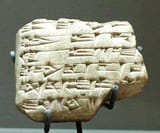Search Results
6/29/2025, 7:30:01 AM
>>17799811
>20th-17th c. BCE
>Yah- (partial, "ia-ah-" in Old Babylonian Akkadian), JCSSS 2, 01 (P480459)/Provenance unknown (British Museum). FM 06, 040 (P479759) / Provenance = Mari (Tell Hariri), Syria
>Yahwi-Ashur (ia-ah-wi-a-szar, in Old Babylonian Akkadian), Theophoric, FM 06, 036 (P479756), FM 06, 036 (P479756), FM 06, 035 (P479755), FM 06, 040 (P479759), ARM 21, 056 (P352058)/ Provenance Mari (Tell Hariri), Syria
Fun Fact:
>Ancient tablets, like the Mari Tablets discovered by French archaeologists during the 1930s AD (at Tell Hariri), confirmed the common use of many personal names and towns listed in Genesis. Ruins of ancient Mari are located in Syria on the Euphrates River near the border with Iraq. The city was an important trade center along the route between Egypt, Babylon and Persia. Archaeologists found thousands of clay tablets that included town and personal names
>Among them were Nahor (personal name of Abram’s brother – Genesis 11:27 and home town of Rebekah – Genesis 24:10), Abram the Hebrew (‘ibri in Hebrew – Habiru in Mari tablets – Genesis 14), Abam-ram (Abraham), Jacob-el, Banu-yamina (Benjaminites), Arriyuk (Arioch – Genesis 14:1). The use of these names in the Mari Tablets does not necessarily point to the same persons in the Genesis account, but demonstrates that the names were common during the period of the Patriarchs
>One aspect concerns the existence of names in ancient texts like those used in Genesis. The name, Jacob, for instance, has been found in the form Yaqob-el designating a person in an eighteenth century text from Chagar-bazar in Upper Mesopotamia, and designating a place in Palestine in a list of Thutmose III; also in the form Yaqob-har as the name of a Hyksos chief. The name, Abraham, has been found in Babylonian texts of the sixteenth century in the form Abamram, and in other forms at Mari
>20th-17th c. BCE
>Yah- (partial, "ia-ah-" in Old Babylonian Akkadian), JCSSS 2, 01 (P480459)/Provenance unknown (British Museum). FM 06, 040 (P479759) / Provenance = Mari (Tell Hariri), Syria
>Yahwi-Ashur (ia-ah-wi-a-szar, in Old Babylonian Akkadian), Theophoric, FM 06, 036 (P479756), FM 06, 036 (P479756), FM 06, 035 (P479755), FM 06, 040 (P479759), ARM 21, 056 (P352058)/ Provenance Mari (Tell Hariri), Syria
Fun Fact:
>Ancient tablets, like the Mari Tablets discovered by French archaeologists during the 1930s AD (at Tell Hariri), confirmed the common use of many personal names and towns listed in Genesis. Ruins of ancient Mari are located in Syria on the Euphrates River near the border with Iraq. The city was an important trade center along the route between Egypt, Babylon and Persia. Archaeologists found thousands of clay tablets that included town and personal names
>Among them were Nahor (personal name of Abram’s brother – Genesis 11:27 and home town of Rebekah – Genesis 24:10), Abram the Hebrew (‘ibri in Hebrew – Habiru in Mari tablets – Genesis 14), Abam-ram (Abraham), Jacob-el, Banu-yamina (Benjaminites), Arriyuk (Arioch – Genesis 14:1). The use of these names in the Mari Tablets does not necessarily point to the same persons in the Genesis account, but demonstrates that the names were common during the period of the Patriarchs
>One aspect concerns the existence of names in ancient texts like those used in Genesis. The name, Jacob, for instance, has been found in the form Yaqob-el designating a person in an eighteenth century text from Chagar-bazar in Upper Mesopotamia, and designating a place in Palestine in a list of Thutmose III; also in the form Yaqob-har as the name of a Hyksos chief. The name, Abraham, has been found in Babylonian texts of the sixteenth century in the form Abamram, and in other forms at Mari
Page 1
